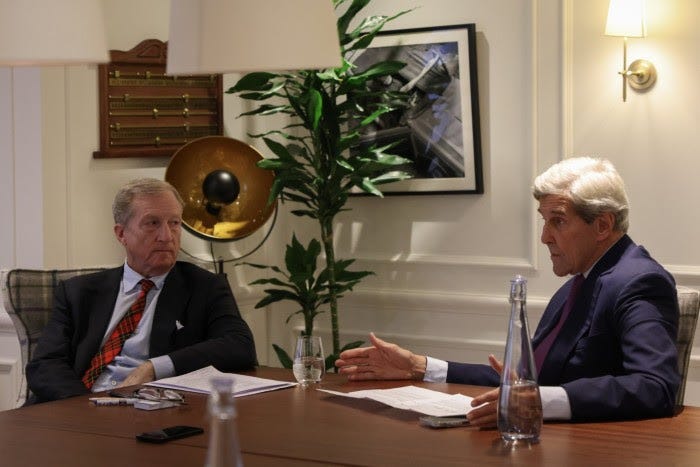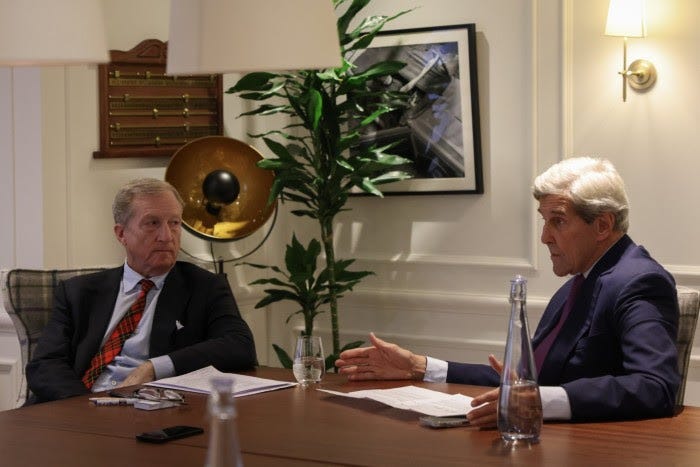John Kerry, the former US secretary of state and climate envoy, has joined the green investment group run by billionaire fund manager and top Democratic donor Tom Steyer, making him the highest paid
He decided to join Galvanize because it was “focused on generating long-term value in the energy transition and working to scale commercially competitive climate solutions” globally.
John Kerry, the former US secretary of state and climate envoy, has joined the green investment group run by billionaire fund manager and top Democratic donor Tom Steyer, making him the most high-profile politician to move into climate finance since former US vice-president Al Gore.
During his time in the Biden administration Kerry advocated strongly for the need to drive private sector capital towards investments that would help reduce greenhouse gas emissions and combat climate change.
Kerry will become co-executive chair of Steyer’s Galvanize Climate Solutions, having indicated he was interested in a role in finance when he stepped downas US special climate envoy in March.
After more than five decades in politics, Kerry had spent months “talking with folks” about roles, he told the Financial Times. He decided to join Galvanize because it was “focused on generating long-term value in the energy transition and working to scale commercially competitive climate solutions” globally.
“This is the most exciting economic transformation since the industrial revolution,” Kerry said.
Steyer set up Galvanize in 2021 with Katie Hall, a fellow alumna of San Francisco-based private equity firm Hellman & Friedman. It closed its inaugural venture fund on $1bn last year, and is in the process of raising money for global equities and real estate strategies focused on decarbonisation.*
Kerry said Galvanize would play a critical role in proving that investments in the energy transition would be both profitable and do good.
He shrugged off concerns about an ebb in green investment fund flows, as climate-focused mutual funds struggled to attract cash during a period of higher interest rates and volatile share valuations for some renewable energy companies.

“We’re going to get to a low-carbon, no-carbon economy,” Kerry said. “Right now, we’re just getting there too slowly. And what we have to do is guarantee that we are applying the best skills, the best analysis, the best judgments to when, where and how you’re going to deploy your capital.”
Steyer added that “markets fluctuate. They go up and down. People’s attitudes move around more than facts do”, but “this transition really is happening”.
Former Kerry senior adviser David Livingston has also joined Galvanize as its chief strategy officer. Livingston previously worked at the Eurasia Group consultancy, focusing on energy, climate and trade, and is on the sustainability advisory council of healthcare group Novo Nordisk.
Recommended
Energy-hungry tech groups express interest in US-led carbon credits scheme
While Galvanize largely invests in western markets, Steyer said it aimed to launch new strategies in the years ahead. “An awful lot of this story will be written in the developing world. We would like to be involved in this in a serious way.”
Steyer made his fortune as the founder of hedge fund Farallon Capital and as a partner of Hellman & Friedman. He spent millions in the race to become the Democratic presidential nominee in 2020, won by Joe Biden.
Kerry’s move into climate finance comes as governments struggle to pay for the upfront costs of reaching net zero greenhouse gas emissions, with growing calls for the private sector to fill the gap.
A report by the Climate Policy Initiative think-tank said last year that climate finance must increase at least fivefold, from about $1.3tn in 2021-22, as soon as possible, to avoid the worst effects of climate change.
*This article has been amended from the original to include a global equities strategy, rather than hedge fund., making him the most high-profile politician to move into climate finance since former US vice-president Al Gore.
During his time in the Biden administration Kerry advocated strongly for the need to drive private sector capital towards investments that would help reduce greenhouse gas emissions and combat climate change.
Kerry will become co-executive chair of Steyer’s Galvanize Climate Solutions, having indicated he was interested in a role in finance when he stepped downas US special climate envoy in March.
After more than five decades in politics, Kerry had spent months “talking with folks” about roles, he told the Financial Times. He decided to join Galvanize because it was “focused on generating long-term value in the energy transition and working to scale commercially competitive climate solutions” globally.
“This is the most exciting economic transformation since the industrial revolution,” Kerry said.
Steyer set up Galvanize in 2021 with Katie Hall, a fellow alumna of San Francisco-based private equity firm Hellman & Friedman. It closed its inaugural venture fund on $1bn last year, and is in the process of raising money for global equities and real estate strategies focused on decarbonisation.*
Kerry said Galvanize would play a critical role in proving that investments in the energy transition would be both profitable and do good.
He shrugged off concerns about an ebb in green investment fund flows, as climate-focused mutual funds struggled to attract cash during a period of higher interest rates and volatile share valuations for some renewable energy companies.

“We’re going to get to a low-carbon, no-carbon economy,” Kerry said. “Right now, we’re just getting there too slowly. And what we have to do is guarantee that we are applying the best skills, the best analysis, the best judgments to when, where and how you’re going to deploy your capital.”
Steyer added that “markets fluctuate. They go up and down. People’s attitudes move around more than facts do”, but “this transition really is happening”.
Former Kerry senior adviser David Livingston has also joined Galvanize as its chief strategy officer. Livingston previously worked at the Eurasia Group consultancy, focusing on energy, climate and trade, and is on the sustainability advisory council of healthcare group Novo Nordisk.
Recommended
Energy-hungry tech groups express interest in US-led carbon credits scheme
While Galvanize largely invests in western markets, Steyer said it aimed to launch new strategies in the years ahead. “An awful lot of this story will be written in the developing world. We would like to be involved in this in a serious way.”
Steyer made his fortune as the founder of hedge fund Farallon Capital and as a partner of Hellman & Friedman. He spent millions in the race to become the Democratic presidential nominee in 2020, won by Joe Biden.
Kerry’s move into climate finance comes as governments struggle to pay for the upfront costs of reaching net zero greenhouse gas emissions, with growing calls for the private sector to fill the gap.
A report by the Climate Policy Initiative think-tank said last year that climate finance must increase at least fivefold, from about $1.3tn in 2021-22, as soon as possible, to avoid the worst effects of climate change.
*This article has been amended from the original to include a global equities strategy, rather than hedge fund.




Democratic party of freedom wanted GHE/GHG/CAGW denial/”disinformation” to be a crime (Walz, et. al.).
Real criminals are the bellicose, screeching, fearmongers and their bogus GHE.
Believe = religion
Think = opinion
Know = science
Here’s what I know.
You??
Water vapor, clouds, ice, snow create 30% albedo which makes the Earth cooler not warmer.
W/o GHE there is no water and Earth goes lunarific, a barren rock ball, 400 K lit side, 100 K dark refuting a warming GHE.
“TFK_bams09” GHE heat balance graphic and ubiquitous clones don’t balance plus violate LoT.
Kinetic heat transfer processes of contiguous atmospheric molecules render a surface black body and it’s “extra” upwelling GHE energy impossible.
GHE is bogus and CAGW a scam so alarmists must resort to fear mongering, lies, lawsuits, censorship and violence.